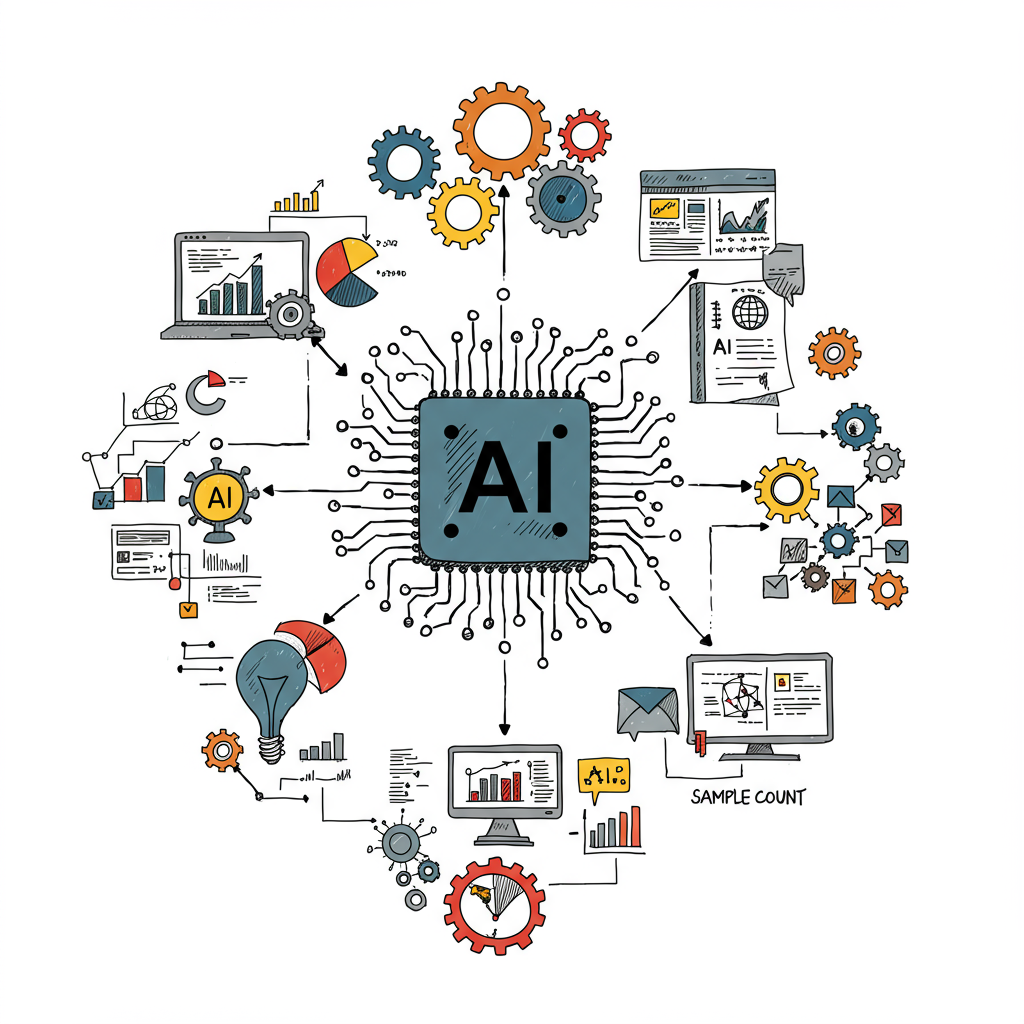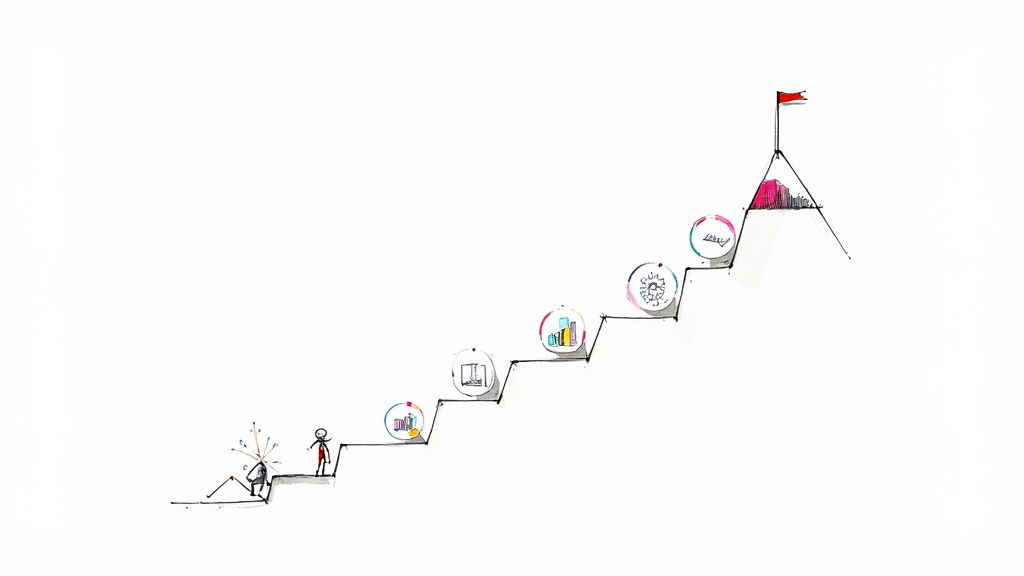AI Strategy vs Tools: Building Smarter AI Adoption
Discover how a solid AI strategy, backed by expert consulting, practical use cases, and clear roadmap services, drives real results in industrial automation, not just shiny tools.

Artificial Intelligence (AI) has become a driving force for enterprises across industries. From startups experimenting with automation to global corporations implementing large-scale AI transformation, the question remains: is success about the tools, or the strategy?
When comparing AI strategy vs tools, it’s easy for organisations to be tempted by the latest technologies. Tools like AI chatbots, data dashboards, or automation platforms promise immediate impact. But without a clear strategy, even the most advanced tools can create confusion, drain budgets, or fail to deliver measurable results.
This has been observed across multiple industries, companies rushing to adopt tools while skipping the foundational planning that a well-structured AI strategy consulting process provides.
What is an AI Strategy?
An AI strategy is more than just a list of tools. It is a structured plan that integrates AI into an organisation’s core operations while aligning with broader business objectives. A robust strategy should act as a roadmap, guiding decisions around data management, infrastructure, workflows, and talent acquisition.
Whether it’s defining AI use cases for customer service automation, improving operational efficiency, or enhancing analytics capabilities, a well-designed strategy ensures the organisation maximises the long-term value of its investments. It should also account for ethical considerations such as bias, transparency, and compliance with evolving regulations.
Without this structured approach, businesses risk fragmented adoption and wasted resources.
Benefits of a Strong AI Strategy
Working with the right AI development partner can help businesses overcome uncertainty. Some of the key benefits of a well-crafted strategy include:
- Alignment with business goals to ensures AI investments directly support measurable outcomes.
- Efficient use of resources and reduces unnecessary spending on tools that do not fit organisational needs.
- Improved decision-making by building a framework for AI models that extract actionable insights.
- Future readiness to Enables scalability and flexibility as new technologies emerge.
An effective strategy doesn’t just improve productivity. It lays the foundation for sustainable transformation.
Challenges Without a Strategy
Many organisations adopt AI tools randomly, hoping they will deliver results. But without alignment, these tools often lead to:
Limited Budgets and High Costs
Smaller businesses especially face challenges balancing tight margins with expensive tools. Finding the right balance is the key of right AI strategy development. However, achieving this is not easier. It requires long and deep learning of the objectives and targets.
Knowledge Gaps
Employees may not have the expertise to deploy or manage tools effectively. This can also cause panic among them and might result in hesitation to integration. This is a major challenge industry faces as AI can’t be selectively integrated in an enterprise.
Technical Hurdles
Legacy IT systems and siloed data create costly integration barriers. Sometimes this causes an entire system change which can be time-consuming as well.
Cultural Resistance
Employees may fear AI will replace jobs, leading to low adoption rates. This can affect the competitive edge of the company. But replacing the entire human resource who hesitates to adapt is not possible.
AI service provider is required to support companies struggling with these exact issues, helping them transition from scattered tool use to structured AI roadmap services.
AI Strategy vs Tools: The Real Difference
While tools are important, they are only part of the equation. A chatbot, automation software, or data analytics platform will only solve isolated problems. A strategy, however, considers the whole system, business goals, employee readiness, workflows, and customer experience.
This distinction is why the conversation about AI strategy vs tools is so critical. Tools provide tactical wins. Strategy delivers sustainable value.
Enterprises should focus not only on AI strategy consulting tools but also on long-term design: where intelligence will create the most impact, how systems will adapt, and how employees will collaborate with AI to scale outcomes.
Why Enterprises Need AI Strategy Consulting
Choosing an AI implementation partner is an architectural decision, not just a technical one. Different businesses need different approaches:
- For financial services, AI strategy might focus on compliance, fraud detection, and real-time risk assessment.
- For retail, it may prioritise personalisation and AI customer journey mapping.
- For healthcare, strategies must align with ethical and regulatory compliance while enhancing patient experience.
An AI development and consulting services include:
- AI adoption roadmaps
- AI maturity assessments
- Enterprise AI use case identification
- Executive workshops for leadership alignment
- Tailored AI roadmap services
Learn more on our AI consulting services page.
Budgeting for AI Strategy
One of the biggest misconceptions about AI adoption is cost. Many businesses assume AI tools are too expensive, but what’s truly costly is wasted investment in the wrong tools. By focusing first on strategy, businesses can allocate budgets to the areas that drive measurable returns.
For example, starting with small pilot projects allows companies to prove ROI before scaling. By contrast, tool-first approaches often lead to overspending without long-term results.
According to research, 50% of companies already use AI in two or more functions, and those with strong strategies report higher revenue growth.
Why Strategy Must Come First
This article makes it clear that AI strategy vs tools isn’t just a debate, it’s a turning point for businesses. Tools alone cannot deliver transformation. Without strategy, AI adoption risks inefficiency, wasted resources, and employee resistance.
Explore industry based AI strategy reports on our website to have insights on purposeful adoption paths, employee empowerment, and to unlock sustainable growth.
If your organisation is ready to move beyond scattered tool adoption and design a future-proof AI roadmap, speak with our experts.



